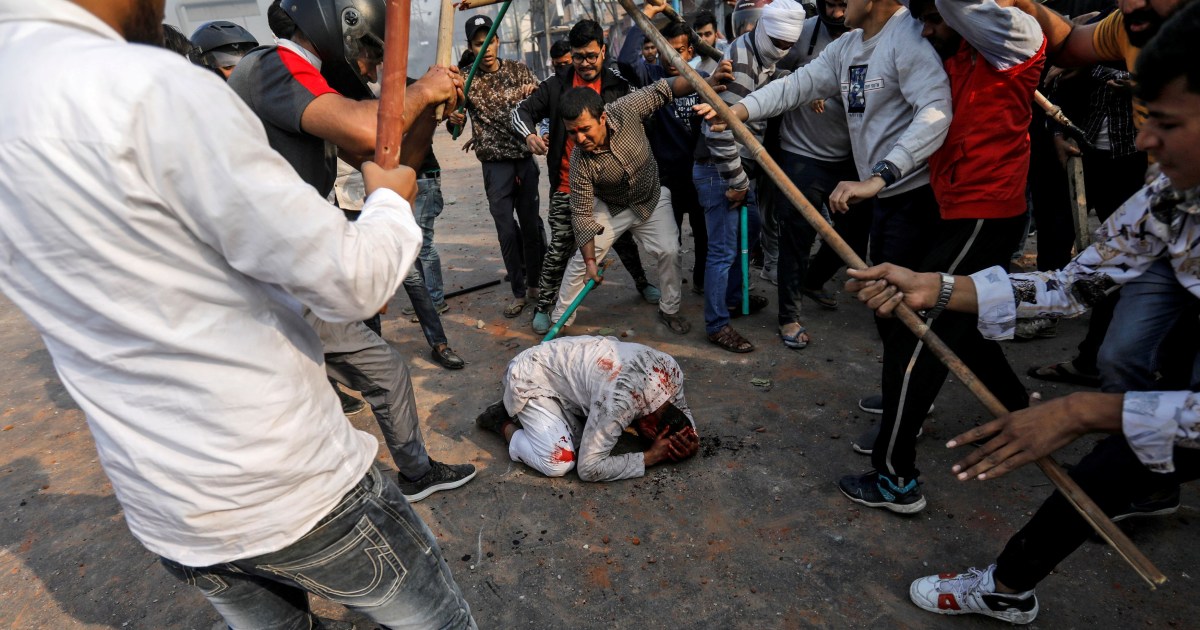Attacks targeting Muslims in India increased and took various forms during the past months, with a weak response from the Hindu nationalist government headed by Prime Minister Narendra Modi.
A report by the British "BBC" network monitored incidents targeting Muslims, including footage spread on social media last month showing a terrified young girl clinging to her Muslim father while a Hindu crowd assaulted him.
The footage showed the girl begging the assailants to stop beating her 45-year-old father, and the phrases she chanted under threat - such as "Long live India" and "victory to God Ram" - did not calm the crowds that did not stop beating her father until the police arrived at the scene. The area is located in the northern state of Uttar Pradesh.
The report stated that the police released on bail the following day, 3 assailants who were arrested in the incident.
The attacks monitored by the report included the assault on a Muslim vendor in a Hindu region, a 14-year-old Muslim boy was violently assaulted for entering a Hindu temple to drink water, and a vendor was beaten in Delhi for selling fruit in a Hindu region.
These incidents reflect the increasing targeting of India's largest religious minority, numbering more than 200 million.
"Violence is common, rampant and totally acceptable," said Ali Shan Jafari, a freelance journalist who has documented attacks on Indian Muslims over the past three years.
He explained that he encounters "3 to 4 videos like this every day", but is able to check only one or two of them, and then post them on social media.
The report pointed out that religious divisions have long been known in India, but government critics say that violence against Muslims has escalated since 2014 under the government led by Narendra Modi.
"Sectarian violence is not a recent phenomenon, but it is growing in line with the strategies of those in power and political mobilization," said Tanweer Ijaz, a professor of political science at Delhi University.
The prime minister is facing criticism for not condemning the attacks quickly and with the required intensity, but Prakash Javadekar - a prominent leader in the ruling Bharatiya Janata Party - accused the media of bias and selectivity, and of focusing on attacks on Muslims.
"If you look at the official data, out of the 200 extrajudicial killings, 160 Hindus were killed, and people of all faiths were targeted," he said.
But he did not mention the source of the data because India does not collect such data.
And the BBC report quoted a site that counts "hate crimes" in India that more than 90% of the victims in the past ten years were Muslims.
The report pointed out that the perpetrators of the attacks were not punished, amid accusations that they enjoyed political patronage from the "Bharatiya Janata Party" led by Modi, as a former minister honored 8 Hindus convicted of killing a Muslim.
"Such attacks have become very common in India today and only because of the impunity these thugs enjoy," says Hassiba Amin, the opposition Congress's social media coordinator.
“Today, hatred has become a tyrant, and attacks on Muslims are desirable, and the advocates of hate are rewarded for their actions.”
The report stated that targeting Muslims is not limited to physical attacks, but takes other forms aimed at discrediting the Muslim minority, such as accusing Hindu leaders - including Modi and his party officials - Muslim men who attended a religious gathering in Delhi of practicing “Corona jihad” by practicing the behavior of It would spread the virus.
Then followed the rumor of "bread jihad roti", in which it was stated that Muslim chefs who baked Indian "roti bread" spit on bread to spread the virus among Hindus.
Laws are used to harass and imprison Muslim men married to Hindu women, and Muslim women have not been spared attacks and abuse;
Last July, dozens of them discovered that they were being "for sale" through fake online auctions.
Last month, participants at a rally organized by a former Bharatiya Janata Party leader in Delhi chanted slogans calling for Muslims to be killed.
"It is an organized and ongoing campaign by nationalist politicians to radicalize Hindus to make them believe that Muslims must be marginalized if Hindus are to progress," Jafari says.
Ejaz points out that assaults on the Muslim working class - such as tailors, fruit sellers, electricians, plumbers, and cake sellers - are also an attempt to control the economy and jobs through religious nationalism.
Professor Ijaz sees religious nationalism as a dangerous idea that can lead to sectarian violence, adding that "the ruling political authority in a parliamentary democracy bears the responsibility. How long can it ignore that?"

